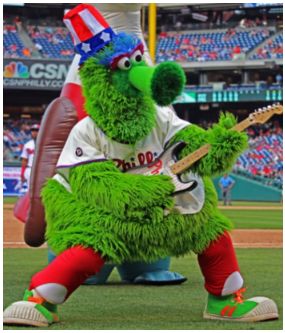The Philadelphia Phillies are currently in a copyright battle with the design firm Harrison/Erickson Inc., which created the beloved Phillie Phanatic.
The green-feathered Phanatic "hatched" back in 1978, when Harrison/Erickson assigned the rights to the mascot costume to the Philadelphia Phillies for $3,900. And for the last thirty-five years, the popular belly-shaking, popcorn-throwing, ATV-riding Phanatic has entertained baseball fans across the globe.

According to the Phillies declaratory judgment complaint, Harrison/Erickson had been handsomely paid for its work. While the initial work to create the Phanatic allegedly took only about two weeks of work, and $2,000 in expenses, Harrison/Erickson had earned over $200,000 by the end of January 1980. The Phanatic's success caused Harrison/Erickson to pursue further compensation for its work. In 1984, it succeeded in renegotiating the deal and obtained an additional $215,000 for an assignment of all rights in the Phanatic to the Phillies, "forever."
But in 2018, Harrison/Erickson notified the Phillies that it intended to exercise its right to terminate the previous assignment agreements under Section 203 of the Copyright Act (17 U.S.C. § 203), which allows authors to terminate "the exclusive or nonexclusive grant of a transfer or license of copyright or of any right under a copyright" thirty-five years after the initial grant, unless the parties could come to a new agreement.
In response, in August 2019, the Phillies filed a declaratory judgment action in the Southern District of New York to stop Harrison/Erickson from terminating the team's rights to the Phanatic under Section 203. The Phillies make myriad arguments, but its principal positions appear to be that (1) Section 203 allows authors "only one right to renegotiate the terms of a license or assignment," and Harrison/Erickson "exhausted" that "single opportunity" when it obtained a new assignment in 1984; (2) even if it was able to terminate an agreement expressly labeled as "forever," Harrison/Erickson "cannot enforce its purported copyright in the Phanatic costume" (the Phillies' argument on this point is that Harrison/Erickson fraudulently obtained the copyright when it told the Copyright Office that the Phanatic costume was an "artistic sculpture" rather than a "costume," since the Office would allegedly not have registered the copyright if it had known the truth); and (3) because Phillies personnel (including Vice President Bill Giles) were involved in the initial design of the Phanatic, the Phillies must be considered a joint author of the Phanatic costume, and Section 203 allows only "the sole author" to recapture authorship rights. The Phillies also assert that, no matter what, Harrison/Erickson cannot terminate the Phillies' rights to use "derivative works"—that is, works that are new and original, but based on the Phanatic—that were developed before the assignment could allegedly be terminated on June 15, 2020. And adding a further wrinkle to the dispute, the Phillies claim that they have trademark rights in both the name Phanatic and the design of the Phanatic, that those rights are incontestable, and that allowing Harrison/Erickson to follow through on its threat to make the Phanatic "a free agent" would "confuse consumers" and violate the Lanham Act.
Harrison/Erickson responded to the declaratory judgment complaint and filed counterclaims against the Phillies. Harrison/Erickson denies the team's assertions that it contributed to the design of the Phanatic, and is thus the Phanatic's co-author, saying that, "The truth is that other than wanting it to be named the Phanatic, Giles and The Phillies had no input into the design and creation of the Phanatic." Harrison/Erickson also claims that it has a legitimate right to terminate the 1984 assignment and that continued use of the Phanatic after termination would be copyright infringement.
Harrison/Erickson does not deny that, as a factual matter, the 1984 renegotiated assignment was said to be "forever." Instead, it asserts that to ensure that a copyright owner's right to terminate an assignment after 35 years "could not be overridden by contract," Congress made the right "inalienable." And because it's "inalienable," Harrison/Erickson asserts, the right can be exercised "notwithstanding any agreement to the contrary." Further, other than denying it, Harrison/Erickson does not respond to the Phillies' assertion that while Section 203 allows the copyright owner to terminate an assignment after 35 years, that can be done only once—and Harrison/Erickson used its one opportunity to terminate when it renegotiated the assignment in 1984.
With the legal dispute still pending in court, the Phillies recently unveiled a modified version of the Phanatic. The changes included altering the shape of the Phanatic's eyelids, adding scales under his arms, coloring his tail feathers light blue, and changing his socks and sneakers. It is likely that the litigation will also entangle this new iteration of the Phanatic.
It is hard to imagine that the Phillie Phanatic may not be driving his ATV around the ballpark once this lawsuit is over, but it could happen if the Phillies and Harrison/Erickson are not able to resolve this dispute.
This case is The Phillies vs. Harrison/Erickson, Inc., 1:19-cv-07239-VM-SN (S.D.N.Y. Aug. 2, 2019).
The content of this article is intended to provide a general guide to the subject matter. Specialist advice should be sought about your specific circumstances.

